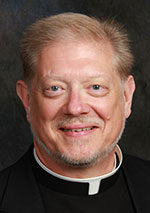That All May Be One / Fr. Rick Ginther
Week making Christian unity a sign of universality for believers
 As we hurtle toward the Christmas season and a new calendar year, we might be tempted to see only that which is in front of us. After all, we have enough to plan for, prepare for, celebrate and then recover!
As we hurtle toward the Christmas season and a new calendar year, we might be tempted to see only that which is in front of us. After all, we have enough to plan for, prepare for, celebrate and then recover!
Sorry, I am going to violate that.
Jan. 18-25 each year is the Week of Prayer for Christian Unity (WPCU). This octave calls heightened attention to unity among those who believe in Christ.
This is not to say that Christians pray for unity only during this octave. We do not seek to face our sinfulness and be converted to Christ only during Lent, do we? Christian unity is a full-time pilgrimage.
Three years ago, the United States was chosen to lead the WPCU planning for 2023. In turn, the Minnesota Council of Churches was the regional body chosen to create the theme and choose the central Scripture passage. As in past years, the theme arose from the reality of a region.
In 2018, the week centered on how Scripture had been used to the good (freedom) and evil (slavery) at the same time in the Caribbean.
In 2020, the creators were from Malta. They focused on care for refugees—a reality they face every day—based in the shipwreck of St. Paul on that island.
The 2023 theme “Do Good, Seek Justice” and Scripture (Is 1:12-18) center on racism and prejudice toward people of color and indigenous peoples of the United States.
“[T]he theological work on unity done by the World Council of Churches’ Commission on Faith and Order [and the Pontifical Council for Promoting Christian Unity have] traditionally sought to hold together the search for the churches’ unity and the search for overcoming walls of separation within the human family,” read the preparation notes in the resource materials for WPCU 2023.
“That is why prayer, especially prayer for Christian unity, takes an even more important meaning when it takes place in the heart of the struggles against what separates us as humans created with equal dignity in the image and likeness of God,” the resource materials continue.
The indigenous peoples of Minnesota have endured a long history of oppression—even murder—since colonization. This truth played a part in choosing the theme.
The more recent murder of George Floyd in 2020 did as well. That tragedy was rooted in the racism that is a sad legacy and reality in that region. It played a part in choosing Isaiah 1:12-18.
The reflection and faith sharing texts for 2023 explore these human injustices. They also seek for anyone participating to face them. All are called to “learn to do good,” “seek justice,” “rescue the oppressed” and “defend the orphan and plead for the widow.” In short, the most vulnerable among us are our focus.
The prayer service has a flow similar to past services. After prelude music and the procession of all the ministers, a call to gather and singing takes place. Simple words of welcome are given, and then there is a litany of confession and forgiveness. A Scripture passage, psalm response and Gospel passage are proclaimed. Then there is preaching.
Unique to this service is a tangible focus: stones and rivers (water). These are symbols in Minnesota of cultural genesis and genocide at points in the region’s history.
The service concludes with intercessory prayers, the praying together of the Our Father, followed by a closing prayer and a sending.
If you are in the Indianapolis area on Jan. 19, please join us at 7 p.m. for the prayer service at Christ Church Episcopal Cathedral on Monument Circle. Episcopal Bishop Jennifer Baskerville-Burrows will preach.
For more details on the upcoming service, go to www.archindy.org/ecumenism. Click on “latest news” to find the WPCU document.
(Father Rick Ginther is director of the archdiocesan Office of Ecumenism and Interreligious Affairs. He is also the pastor of Our Lady of Lourdes Parish in Indianapolis.) †
 As we hurtle toward the Christmas season and a new calendar year, we might be tempted to see only that which is in front of us. After all, we have enough to plan for, prepare for, celebrate and then recover!
As we hurtle toward the Christmas season and a new calendar year, we might be tempted to see only that which is in front of us. After all, we have enough to plan for, prepare for, celebrate and then recover!